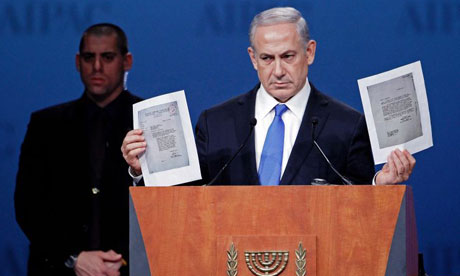 Israeli prime minister Binyamin Netanyahu holds copies of 1944 correspondence asking the US war department to bomb the Auschwitz concentration camp Photograph: Chip Somodevilla/Getty Images
Israeli prime minister Binyamin Netanyahu holds copies of 1944 correspondence asking the US war department to bomb the Auschwitz concentration camp Photograph: Chip Somodevilla/Getty Images
Binyamin Netanyahu, the Israeli prime minister, invoked the spectre of Auschwitz as he chided those who question whether Iran is in pursuit of a nuclear weapon and warned that „none of us can afford to wait much longer” to act against Tehran.
In an address to the powerful pro-Israel lobby in Washington, Netanyahu derided the effectiveness of sanctions hours after a meeting with Barack Obama at which the US president appealed for time for diplomacy to pressure Iran to open up its nuclear programme to inspection.
At the strained White House meeting, the Israeli prime minister responded to Obama’s demand for an end to „loose talk of war” and bluster over Iran by reiterating the Jewish state’s „right to defend itself”.
Speaking to the American Israel Public Affairs Committee (Aipac) hours later, Netanyahu questioned the premise of US policy that Iran has not yet made the decision to develop a nuclear weapon.
„Amazingly, some people refuse to acknowledge that Iran’s goal is to develop nuclear weapons. You see, Iran claims that it’s enriching uranium to develop medical research. Yeah, right,” he said. „If it looks like a duck, walks like a duck, and quacks like a duck, then what is it? That’s right, it’s a duck. But this duck is a nuclear duck and it’s time the world started calling a duck a duck.
„Fortunately, President Obama and most world leaders understand that the idea that Iran’s goal is not to develop nuclear weapons is ridiculous.”
In fact, Obama has consistently said that US intelligence does not show Iran is working towards a nuclear bomb or has decided to do so. Washington believes that even if Iran decides to develop a nuclear weapon, it is at least a year away from being able to do so.
At the White House meeting, the US president again urged that sanctions be given time to work. Netanyahu was dismissive in his speech to Aipac.
„For the last decade, the international community has tried diplomacy. It hasn’t worked. For six years, the international community has applied sanctions. That hasn’t worked either. I appreciate President Obama’s recent efforts to impose even tougher sanctions against Iran. Those sanctions are hurting Iran’s economy. But unfortunately, Iran’s nuclear march goes on,” he said.
„Israel has waited patiently for the international community to resolve this issue. We’ve waited for diplomacy to work. We’ve waited for sanctions to work. None of us can afford to wait much longer.”
Netanyahu arrived in Washington planning to press Obama to commit to military action against Iran if it crosses specified „red lines” in development of its nuclear programme or fails to meet demands to dismantle its underground nuclear facility in Qom and to halt uranium enrichment.
US officials say the president did not want to make any such commitment, even though he says the military option remains on the table, out of concern that it will be seen as implicitly endorsing an Israeli attack if the demands are not met.
It’s not known if Netanyahu pressed the case at his one-on-one session with Obama and the Israeli prime minister told Aipac he wasn’t going to discuss it in public.
„I’m not going to talk to you about what Israel will do or will not do. I never talk about that,” he said.
In his own speech to Aipac on Sunday, Obama demanded an end to the „loose talk of war” and „bluster” against Iran – a clear reference to the noise out of Netanyahu’s government. At the same time the US president repeated his reassurance that he „has Israel’s back”.
At the White House meeting, Obama spoke of the „difficult months” ahead.
„It is profoundly in the United States’ interest as well to prevent Iran from obtaining a nuclear weapon,” he said. „That’s why we have worked so diligently to set up the most crippling sanctions ever with respect to Iran. We do believe that there is still a window that allows for a diplomatic resolution to this issue, but ultimately the Iranians’ regime has to make a decision to move in that direction, a decision that they have not made thus far.
„My policy is prevention of Iran obtaining nuclear weapons… When I say all options are at the table, I mean it. Having said that, I know that both the prime minister and I prefer to resolve this diplomatically. We understand the costs of any military action.”
But Netanyahu told Aipac: „There’s been plenty of talk recently about the costs of stopping Iran. I think it’s time to talk about the costs of not stopping Iran.”
The Israeli prime minister invoked the Holocaust in saying he would not allow Israelis to „live under the shadow of annihilation”. He said he had in his desk a copy of a letter from the World Jewish Congress asking the US war department to bomb the Auschwitz death camp in 1944.
Netanyahu said that in their reply the Americans said that such an operation would require them to divert too many aircraft from other missions and it probably wouldn’t succeed.
„And here’s the most remarkable sentence of all, and I quote: ‘Such an effort might provoke even more vindictive action by the Germans’. Think about that – ‘even more vindictive action’ – than the Holocaust,” he said. „Today we have a state of our own. The purpose of the Jewish state is to secure the Jewish future. That is why Israel must always have the ability to defend itself, by itself, against any threat. We deeply appreciate the great alliance between our two countries. But when it comes to Israel’s survival, we must always remain the masters of our fate.”
Netanyahu – who tellingly made no mention of the conflict with the Palestinians, exposing how it has been sidelined by the whipping up of the Iran crisis – was talking to a sympathetic audience of 13,000 Aipac members who loudly cheered and clapped the Israeli leader. But he was also addressing a powerful one.
More than half the members of the US Congress were in attendance, a reflection of Aipac’s influence on Capitol Hill where it has been a driving force in pressing for stronger sanctions legislation against Iran and upping the rhetoric.
The Republican leader in the Senate, Mitch McConnell, addressed the conference shortly before Netanyahu and backed the Israeli wish to see Obama make an explicit threat of military action against Iran if red lines are crossed, although he did not mention Netanyahu’s demands for the dismantling of existing nuclear facilities.
McConnell blamed Obama’s attempts to engage with the Iranian leadership when he first came to power for allowing Tehran time to develop its nuclear programme, describing the approach as a „critical flaw” in policy.
He said that Obama is now relying too heavily on sanctions and called for a „clear declarative policy of what we will do and why”.
„This is the policy I recommend: If Iran at any time begins to enrich uranium to weapons grade levels or decides to go forward with a weapons programme, then the United States would use overwhelming force to end that programme,” McConnell said to loud cheers and applause and whistles.
„All that’s been lacking until now is a clear declarative policy, and if the administration’s reluctant for some reason to articulate it then Congress will attempt to do it for them.”
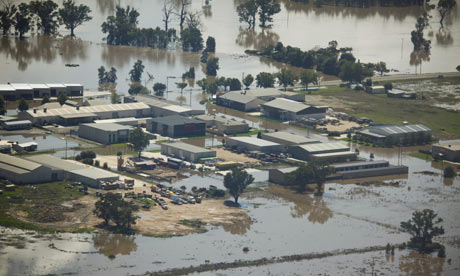 Aerial view from a helicopter of flooded areas in Wagga Wagga in southwest NSW, Australia Photograph: Lukas Coch/EPA
Aerial view from a helicopter of flooded areas in Wagga Wagga in southwest NSW, Australia Photograph: Lukas Coch/EPA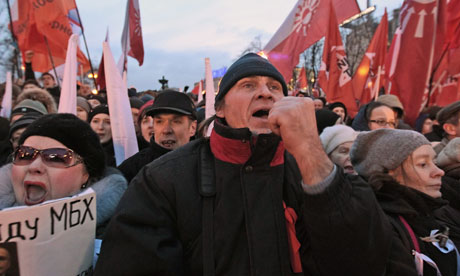 Protesters chant ‘Russia without Putin’ at an opposition demonstration in Moscow after the election results were announced. Photograph: Sergeo Ilnitsky/EPA
Protesters chant ‘Russia without Putin’ at an opposition demonstration in Moscow after the election results were announced. Photograph: Sergeo Ilnitsky/EPA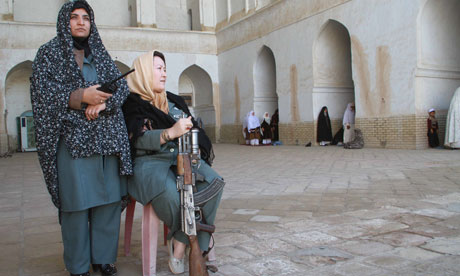 Afghan policewomen at work: guidelines released by the country’s top clerics have been described as reminiscent of the Taliban era when women couldn’t go out without a male guardian. Photograph: Jalil Rezayee/EPA
Afghan policewomen at work: guidelines released by the country’s top clerics have been described as reminiscent of the Taliban era when women couldn’t go out without a male guardian. Photograph: Jalil Rezayee/EPA Thousands of Syrians have fled the Assad crackdown in Homs, including Hassana Abu Firas and her family. Photograph: Hussein Malla/AP
Thousands of Syrians have fled the Assad crackdown in Homs, including Hassana Abu Firas and her family. Photograph: Hussein Malla/AP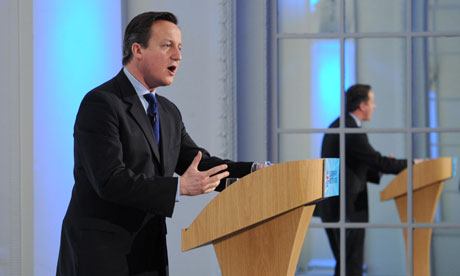 The PM wants to deal with child benefit’s ‘cliff edge’ problem that means a two-income family could be more favourably treated. Photograph: Stefan Rousseau/PA
The PM wants to deal with child benefit’s ‘cliff edge’ problem that means a two-income family could be more favourably treated. Photograph: Stefan Rousseau/PA